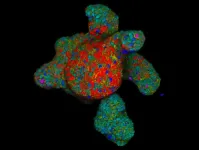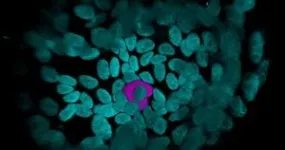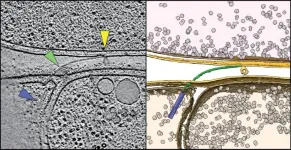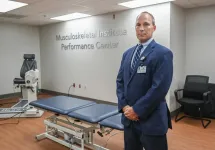(Press-News.org) A multi-institutional group of researchers led by the Hubrecht Institute and Roche’s Institute of Human Biology has developed strategies to identify regulators of intestinal hormone secretion. In response to incoming food, these hormones are secreted by rare hormone producing cells in the gut and play key roles in managing digestion and appetite. The team has developed new tools to identify potential ‘nutrient sensors’ on these hormone producing cells and study their function. This could result in new strategies to interfere with the release of these hormones and provide avenues for the treatment of a variety of metabolic or gut motility disorders. The work will be presented in an article in Science, on October 18th.
The intestine acts as a vital barrier. It protects the body from harmful bacteria and highly dynamic pH levels, while allowing nutrients and vitamins to enter the bloodstream. The gut is also home to endocrine cells, which secrete many hormones that regulate bodily functions. These enteroendocrine cells (EECs, endocrine cells of the gut) are very rare cells that release hormones in response to various triggers, such as stretching of the stomach, energy levels and nutrients from food. These hormones in turn regulate key aspects of physiology in response to the incoming food, such as digestion and appetite. Thus, EECs are the body’s first responders to incoming food, and instruct and prepare the rest of the body for what is coming.
Medications that mimic gut hormones, most famously GLP-1, are very promising for the treatment of multiple metabolic diseases. Directly manipulating EECs to adjust hormone secretion could open up new therapeutic options. However, it has been challenging to understand how gut hormone release can be influenced effectively. Researchers have had trouble identifying the sensors on EECs, because EECs themselves represent less than 1% of cells in the intestinal epithelium, and in addition the sensors on these EECs are expressed in low amounts. Current studies mainly rely on mouse models, even though the signals to which mouse EECs respond are likely different compared to those to which human EECs respond. Therefore, new models and approaches were required to study these signals.
Enteroendocrine cells in organoids
The Hubrecht team has previously developed methods to derive large quantities of EECs in human organoids. Organoids contain the same cell types of the organ they are derived from, and are therefore useful to explore the development and function of cells such as EECs. Using a special protein Neurogenin-3, the researchers could generate high numbers of EECs.
In the past, the Hubrecht researchers developed a way to increase the number of EECs in organoids of the intestine. Considering that EECs have different sensors and hormone profiles in different regions of the gut, studying these rare cells requires that the researchers make EEC enriched organoids of all these different regions.In the current study, the team managed to enrich EECs in organoids of other parts of the digestive system, including the stomach. Like the real stomach, these stomach organoids respond to known inducers of hormone release and secrete large amounts of the hormone Ghrelin, which is also called the ‘hunger hormone’ because it plays a key role in signaling hunger to the brain. This confirms that these organoids can be used to study hormone secretion in EECs.
EEC sensors
Since EECs are rare, researchers have struggled to profile many EECs. In the current study, the team identified a so-called surface marker, called CD200, on human EECs. The researchers used this surface marker to isolate a large number of human EECs from organoids and study their sensors. This revealed numerous receptor proteins that had not yet been identified in EECs. The team then stimulated the organoids with molecules that would activate these receptors and identified multiple new sensory receptors that control hormone release. When these receptors were inactivated using CRISPR-based gene editing, hormone secretion was often blocked.
With these data, the researchers can now predict how human EECs respond when certain sensory receptors are activated. Their findings thus pave the way for additional studies to explore the effects of these receptor activations. The EEC enriched organoids will allow the team to perform larger, unbiased studies to identify new regulators of hormone secretion. These studies may eventually lead to therapies for metabolic diseases and gut motility disorders.
***
About Hans Clevers
Hans Clevers is advisor/guest researcher at the Hubrecht Institute for Developmental Biology and Stem Cell Research (KNAW) and at the Princess Máxima Center for Pediatric Oncology. He holds a professorship in Molecular Genetics from the Utrecht University and is Investigator at Oncode Institute. Hans Clevers has been the Head of Pharma Research and Early Development (pRED) at Roche since 2022. He previously held directorship/President positions at the Hubrecht Institute, the Royal Netherlands Academy of Arts and Sciences and the Princess Máxima Center for pediatric oncology.
About the Hubrecht Institute
The Hubrecht Institute is a research institute focused on developmental and stem cell biology. Because of the dynamic character of the research, the institute as a variable number of research group, around 20, that do fundamental, multidisciplinary research on healthy and diseased cells, tissues and organisms. The Hubrecht Institute is a research institute of the Royal Netherlands Academy of Arts and Sciences (KNAW), situated on Utrecht Science Park. Since 2008, the institute is affiliated with the UMC Utrecht, advancing the translation of research to the clinic. The Hubrecht Institute has a partnership with the European Molecular Biology Laboratory (EMBL). For more information, visit www.hubrecht.eu.
END
Gut instincts: Intestinal nutrient sensors
2024-10-17
ELSE PRESS RELEASES FROM THIS DATE:
Catching prey with grappling hooks and cannons
2024-10-17
Countless bacteria call the vastness of the oceans home, and they all face the same problem: the nutrients they need to grow and multiply are scarce and unevenly distributed in the waters around them. In some spots they are present in abundance, but in many places they are sorely lacking. This has led a few bacteria to develop into efficient hunters to tap into new sources of sustenance in the form of other microorganisms.
Although this strategy is very successful, researchers have so far found only a few predatory bacterial species. One is the soil bacterium Myxococcus xanthus; ...
Effects of chemical mixtures: Neurotoxic effects add up
2024-10-17
"In our everyday lives, we are exposed to a wide variety of chemicals that are distributed and accumulate in our bodies. These are highly complex mixtures that can affect bodily functions and our health," says Prof Beate Escher, Head of the UFZ Department of Cell Toxicology and Professor at the University of Tübingen. "It is known from environmental and water studies that the effects of chemicals add up when they occur in low concentrations in complex mixtures. Whether this is also the case in the human body has not yet been sufficiently investigated - this is precisely where our study comes in."
The extensive research work was based on over 600 blood samples from ...
Mpox in Africa was neglected during the previous outbreak, and requires urgent action and investment by leaders now to prevent global spread
2024-10-17
Mpox in Africa was neglected during the previous outbreak, and requires urgent action and investment by leaders now to prevent global spread, claim experts from The Independent Panel for Pandemic Preparedness and Response, ex-NZ Prime Minister Helen Clark, former Liberian President and Nobel Peace Prize winner Ellen Johnson Sirleaf, and other global health specialists.
####
Article URL: https://journals.plos.org/globalpublichealth/article?id=10.1371/journal.pgph.0003714
Article Title: Mpox: Neglect has led to a more dangerous virus now spreading across borders, harming and killing people. Leaders must take action to stop mpox now
Author Countries: ...
A new era of treating neurological diseases at the blood-brain-immune interface
2024-10-17
SAN FRANCISCO—The question of what causes complex neurological diseases such as Alzheimer’s or multiple sclerosis continues to confound scientists and doctors, with the unknowns standing in the way of early diagnoses and effective treatments.
Even among identical twins who share the same genetic risk factors, one may develop a particular neurological disease while the other does not.
That’s because unlike diseases such as cystic fibrosis or sickle-cell anemia, which are caused by a single gene, most neurological disorders are associated with many—sometimes hundreds—of rare genetic variants. ...
Astronomers detect ancient lonely quasars with murky origins
2024-10-17
A quasar is the extremely bright core of a galaxy that hosts an active supermassive black hole at its center. As the black hole draws in surrounding gas and dust, it blasts out an enormous amount of energy, making quasars some of the brightest objects in the universe. Quasars have been observed as early as a few hundred million years after the Big Bang, and it’s been a mystery as to how these objects could have grown so bright and massive in such a short amount of cosmic time.
Scientists have proposed that the earliest quasars sprang from overly dense ...
New study highlights the dangers of handheld cellphone use among teen drivers
2024-10-17
PHILADELPHIA (October 17, 2024) – A new study, conducted by a group of researchers led by Penn Nursing and Perelman School of Medicine and funded by the Centers for Disease Control, found a strong association between handheld cellphone use and risky driving behaviors among newly licensed teen drivers. The study, published online first in JAMA Open, used a smartphone telematics application to track the driving habits of hundreds of teens and identify potential safety risks.
The investigation found that teens who used their cellphones while driving were significantly more likely to engage in risky driving behaviors, such as hard braking and rapid acceleration. These behaviors can ...
Part of the GBHSH community in Spain uses doxycycline to prevent sexually transmitted diseases
2024-10-17
The increasing incidence of sexually transmitted bacterial infections (STIs) is a major public health problem worldwide. Currently, among the therapies being studied is the use of the antibiotic doxycycline as a method of post-exposure prophylaxis after unprotected sex — known as DoxyPEP. Now, the University of Barcelona and the NGO Stop have carried out the first study in Spain on the use of DoxyPEP as a preventive strategy among the gay, bisexual and other men who have sex with men (GBHSH) community in Spain.
“The results suggest that, although medical and scientific associations rarely endorse the community use of DoxyPEP as a prevention strategy, ...
Researchers at Wake Forest University School of Medicine receive $4.5 million grant from Department of Defense to study neck injuries
2024-10-17
CHARLOTTE, N.C. – Oct. 17, 2024 – Researchers at Wake Forest University School of Medicine have received a three-year, $4.5 million grant from the Department of Defense to study cervical spine injuries in military personnel.
Musculoskeletal injuries, such as those that occur to the cervical spine (neck), are problematic for military personnel. This is especially true for military personnel who must perform missions in demanding environments with head-supported mass. This head-supported mass includes the baseline protective helmet, communications, specialized night vision technology and other attachments.
“These injuries can lead to a significant number of lost-duty ...
Study suggests a healthy diet may help keep low grade prostate cancer from progressing to more dangerous states during active surveillance
2024-10-17
In a peer-reviewed study believed to be the first of its kind published, a research team led by Johns Hopkins Medicine provides scientific evidence that a healthy diet may reduce the chance of low risk prostate cancer progressing to a more aggressive state in men undergoing active surveillance — a clinical option in which men with lower risk cancer are carefully monitored for progression in lieu of treatments that could have undesired side effects or complications.
The findings are reported today in the journal JAMA Oncology.
“Many men diagnosed with low grade prostate cancer are interested in changes they can ...
Center for Genomic Diagnostics receives first USDA grant
2024-10-17
Foreign animal diseases are a global threat to swine production with the potential for detrimental economic implications. Recently, researchers at the University of Illinois Urbana-Champaign received a three-year grant of $650,000 from the U.S. Department of Agriculture to develop sensitive, rapid, low-cost, and portable point-of-use biosensors to improve on-farm detection and surveillance of African swine fever virus.
ASFV is a large DNA virus that infects swine and can result in a lethal hemorrhagic fever, spread rapidly to neighboring pigs, and cause excessive morbidity ...










